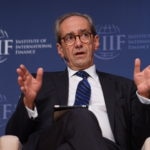BBVA goes over the challenges facing EU banks
Non-performing assets, monetary policy and digitization are the three most pressing challenges that EU banks are facing, according to José Manuel González-Páramo. BBVA’s Executive Board Director participated in the annual meetings of the International Monetary Fund, the World Bank and the Institute of International Finance (IIF) that took place in Washington D.C. last week, which he attended together with a large delegation of BBVA executives.

The debate organized by the IIF, which focused on some of Europe’s most pressing topics, was one of the standouts in the Executive Board Director's packed agenda. During the debate he discussed the three key challenges that the banking sector is facing: reducing the load of legacy non-performing loan portfolios that built up during the crisis, the normalization of economic policy and the adoption of digital technologies. All this in a context of economic recovery, progress in the capital markets union and the debate over the reform of EU institutions.
Regarding non-performing assets, he reminded that, only in the EU, there is still €1 trillion of NPLs outstanding. These assets – regarding which borrowers are unlikely to meet their payment obligations – are expensive to maintain, imply a misallocation of capital, could potentially reinforce the bank-sovereign link and can trigger a decrease in new loans, thus impairing the lending channel for monetary policy.
He also made reference to the normalization of monetary policy, both in Europe and in the United States. In both cases, he called for more clarity from central banks regarding their exit strategy.

José Manuel González-Páramo, BBVA Executive Board Member - IIF
And regarding the challenge of digitization, he noted that banks need to adapt their strategies to survive competition from new entrants in the financial industry, such as tech giants and startups. In his opinion, success will be determined by the ability to take care of customer experience, re-establish reputation and maximize customer convenience, offering better prices and processes to allow them to administer their finances.
Finally, BBVA’s Executive Board Director urged authorities to complete the banking union to improve bank resilience in future crises. In this sense, he admitted to seeing the glass half-empty, due to the lack of progress in financial integration in the euro area, and the need to apply the resolution framework consistently across the EU..
José Manuel González-Páramo participated in a debate entitled ‘Europe Economic and Political Outlook’, one of the panels of the IIF Meeting, which took place on October 13. Other panel speakers joining the debate, moderated by Stephanie Flanders (head of Bloomberg’s Economics Unit), included Michala Marcussen, Group Chief Economist at Société Générale, Reza Moghadam, Vice-Chairman for Sovereign and the Official Institutions at Morgan Stanley; and Jean Pisani-Ferry, Sciences Po.

Álvaro Ortiz, chief economist for Turkey, China and BBVA Research's Geostrategy, attending the panel about 'new data for old problems' of IIF
For his part, Álvaro Ortiz, chief economist for Turkey, China and Geostrategy at BBVA Research, took part in a panel on "new data for old problems," where he explained the advantages of "big data" for the studies service of BBVA. In his view, "big data" can significantly increase efficiency in some areas. such as real-time forecasts. But at the same time, more analysis is needed to differentiate between noise and relevant information.
BBVA uses big data fundamentally for the analysis of geopolitics, politics, globalization, trade and society. It also incorporates big data into its forecasts and in the analysis of sentiment and narratives. Lastly, it uses tools for the analysis of natural language when interpreting speeches on monetary policy or financial stability.